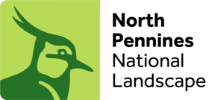News
Looking back, and the view ahead
31 December 2024
Looking back, and the view ahead
By Chris Woodley-Stewart
Director, North Pennines National Landscape
In the North Pennines National Landscape and UNESCO Global Geopark, the team has two clear priorities – nature recovery, and helping people to discover, enjoy and understand their landscape and cultural heritage. As always at this time of year, we look back at where we’ve been and ahead to where we’re going – it’s certainly been another eventful year.
The rebrand of AONBs to National Landscapes seems to have gone incredibly smoothly, and it’s much more than just a new set of logos. We look and feel and act like a more coherent network more than ever before, and we think it’s really helping raise the national profile of these special places, and enabling our collective voice for them to be projected more clearly.
In the field, we’ve continued our pioneering work to restore and re-wet peatlands, working with contractors and landowners, and also acting in the frame of the Great North Bog – our pan-northern coalition focused on restoring all of the remaining damaged peat across the north of England. Our own team has now led on bringing under restoration over 50,000 hectares of peatland- more than four times the size of Newcastle.
The Farming in Protected Landscapes programme, funded by Defra, has now provided four years of funding to farmers, land managers and others to do important work for nature, climate, people and place – all of our funded projects are listed on our website, and we’ve now provided nearly £5m of Farming in Protected Landscapes funding through our staff team, supported by a panel of local farmers and others with in-depth knowledge of the area. We hope Defra will be able to sustain this fund into the next year and possibly beyond. We’ve also been working with farmers in the Allen Valleys this year (with the RSPB) helping to explore what future payments might look like if they can do more for nature on their land. This is being really well-received and, if ambitions can resourced, offers some hope for farm incomes and nature at the same time.
This year has seen the start of our work on adder conservation and celebration, and hundreds of local schoolchildren are now some of our best advocates for adders. The work we’ve been doing in collaboration with Newcastle University is enabling the creation of a new DNA database for adders, that will, allied to further survey work, greatly help with conservation of this threatened species in future.
Through our Lottery-funded collaboration with the Yorkshire Dales National Park Authority on the Tees Swale programme, we’ve continued to work with farmers to restore hay meadows, plant trees and hedges, create many small on-farm wetlands, whilst we’ve seen some of the mine water remediation come to fruition, working alongside the Environment Agency and the Yorkshire Dales Rivers Trust. This work is bringing critically damaged landscapes back from the brink – a rare watery good news story these days.
Thinking back to our mining past, through our Lottery-funded Land of Lead and Silver programme we’ve been working with communities to celebrate and document this part of our heritage and beginning some physical works to conserve it for future generations to enjoy. In this work and across several of our programmes, there’s been a strong focus on working with children and young people, and we’ve worked with literally thousands of them this year on farm visits, nature-residentials, geology adventures, art activities and hands-on work for wildlife. Bowlees Visitor Centre continues to be a focus for this work, and provides a gateway for the visitors to Upper Teesdale and the wider North Pennines.
Our planned promoted walking route around the North Pennines, the Roof of England Walk is taking shape and will launch next year. Meanwhile we’ve been continuing to introduce people to our special dark night skies, through hosting another successful Stargazing Festival with many local partners and astronomers.
We were proud to achieve a Silver Autism Acceptance Award from the North East Autism Society. We want everyone to have the opportunity to connect with nature and the unique landscape of the North Pennines and working towards this award has helped us all to understand what we can do to improve everyone’s experience of and access to this special place.
We hosted the Eurosite Annual Meeting in September, and it gave an opportunity to showcase the area to 150 conservation practitioners from all over Europe. There’s so much to learn from all of these people and the great work they do, but they also went away full of enthusiasm for the North Pennines, and for the work we, our partners and the farming community do here.
All good things come to an end, and this year saw the closure of our National Lottery-funded Fellfoot Forward programme, in the Cumbrian North Pennines. Nature conservation, river restoration, species action, restoring historic buildings and helping thousands of people of all ages discover and enjoy nature and heritage, ‘Fellfoot’ has been a great success, in large part thanks to the fantastic local communities, and partners like RSPB and Eden Rivers Trust, who have all helped to make this work feel very special and have a big impact. Fellfoot has also provided a springboard for our involvement in more partnerships in that part of the North Pennines, and we’ve been very pleased to work with Eden Rivers Trust on their Access to Eden programme this year.
Looking ahead, we’d really hope to be able to maintain the progress we’ve started to see through our Heart of the Pennines Forest project. It’s really not easy finding the right places, and willing landowners, to plant/encourage new native woodland, but as our team were making some strides this work may be slowed by the ever-present spectre of short-termism in funding. On the upside, looking ahead, we hope to secure a significant new partnership conservation project in the south west of the National Landscape, and to submit a major bid to The National Heritage Lottery Fund for North Pennine-wide work for people and nature. We also aim to increase the flow of private sector funding into nature in the North Pennines, on which our Peatland Programme Manager has made great strides (for partners as well as for our team). I hope we’ll also take on more trainees this year; we’ve now given nearly 30 people paid, year-long opportunities to join our team and it creates a huge legacy, for them and for the places in which they’ll work in future.
People may see our team members in the field and in meetings, but the wheels are all kept on by our outstanding admin and finance team, and the word about the work is spread by our great communications colleagues. It’s a whole team effort.
We don’t own any land and we have no ‘power’ and so we work by the consent of others, especially the farming and landowning community, and alongside many outstanding partners. Sustaining the farming community of the uplands is vital for nature restoration. Society is, in part, changing the ‘contract’ we have with farming, rightly looking for it to be ‘nature-friendly’ in all respects; but if we change the rules, we have to provide the tools – and the next few years may shape farming (and, therefore, nature) for a long time to come. Government has to get this right.
Twenty-five years ago, the Countryside Agency advised the last incoming Labour Government as to the funds needed to run what are now called our National Landscapes – yet in real terms they receive only 20% of that funding now. We don’t expect good news for National Landscapes in the 2025/26 settlement, but we have to hope that the proposed three-year spending review during the coming year will finally, after decades of promises, provide more equitable and sustainable core funding for our National Landscape teams, for all they do, with many others, to help sustain our most valuable landscapes and to help super-charge nature recovery – as surely we must.
Thank you to the farming and land management community, our many conservation partners, dedicated volunteers, local communities, and to the organisations that have provided financial and other support, including local authorities, Defra, Lottery players via The National Lottery Heritage Fund, Esmée Fairbairn and many more – we are grateful to you all.
We wish you a happy and healthy Christmas and New Year, and hope that 2025 can herald the start of a brighter future for nature, because we all rely on it, for all that we have in this world.







